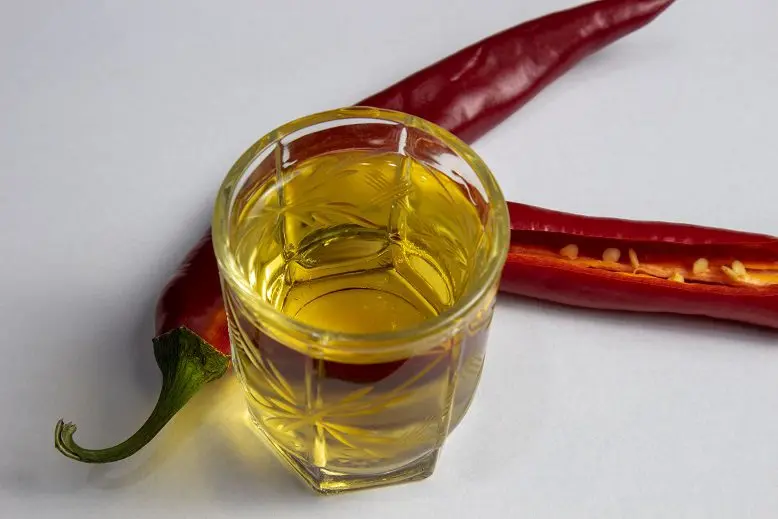Contents
The fruits of capsicum (Cápsicum ánnuum) have long been used in folk medicine as a warming agent. The plant is often called hot pepper: it has a burning taste. A strong cut is guaranteed, even if the hand that touched the capsicum accidentally rubs the eyes. Therefore, when using hot pepper tincture, you need to ensure that it does not get into your eyes.
Healing properties of capsicum
Capsicum is rich in capsaicin, an alkaloid that modern pharmacology classifies as an irritant of natural origin. Capsaicin burns the mucous membrane, has a bactericidal and analgesic effect.
Capsicum also contains vitamins C, groups B and P. These substances are flavonoids. They have a beneficial effect on the immune system, strengthen the walls of blood vessels, accelerate tissue regeneration and serve as antioxidants.
Capsicum tincture is used in the following cases:
- with a cold – externally and internally;
- with frostbite;
- with radiculitis, inflammation of the joints – compresses and rubbing;
- to accelerate growth and strengthen hair – rubbing and masks;
- in case of poisoning, indigestion – internally as a disinfectant.
Preparation of tincture of capsicum
To prepare the tincture, 100 g of capsicum (about 5 pieces 12–14 cm long) are cut into large pieces, put in a glass jar and poured with 500 ml of vodka, good double-cleaned moonshine or alcohol. However, alcohol enhances the burning properties of pepper, so in order not to damage the mucous membrane, it is better to either immediately use alcohol with a strength of up to 40-45 degrees, or dilute the finished tincture with 70-degree alcohol with water.
The resulting tincture is suitable for external use. If you have to take the remedy inside, it should be measured with teaspoons and diluted with water.

There is another recipe for capsicum tincture, which can be drunk undiluted for poisoning or to improve digestion.
To prepare a “table” tincture, 1-3 peppers (to taste) are cut into pieces, placed in a jar and poured with 0,5 liters of vodka. To soften the taste of the tincture, add 1-2 tablespoons of honey or sugar, 2-3 strips of lemon peel, half a cinnamon stick, 5 g of vanilla sugar to it.
Application of tincture of capsicum
For indigestion, nausea, vomiting caused by food poisoning, 1-2 teaspoons of the tincture prepared according to the main recipe are mixed with 50-100 ml of boiled water and drunk at least 30 minutes before meals. Instead, you can drink 30-50 ml of a less pungent “table” tincture.
The medicine in the same dosage helps well with hypothermia or the onset of a cold. At the same time, the main tincture is diluted with water in a ratio of 1: 1 and the patient’s back is thoroughly rubbed with this agent, after which he should wrap himself warmly and lie down. With a runny nose in the evening, before going to bed, the patient’s feet are wrapped in cloth napkins soaked in tincture, cellophane or polyethylene is applied on top and warm socks are put on. Significant improvement is felt the next morning.
If there is a risk of frostbite, the tincture in a ratio of 1: 1 is mixed with melted pork fat. It is advisable to use internal fat melted in a water bath: it is most easily absorbed into the skin. The affected areas of the skin, including the face, are rubbed with this mixture (for example, the nose often suffers from skiers).
With sciatica and inflammation of the joints, compresses from diluted tincture water warm well and relieve pain. They need to be put in the evening, before going to bed, or during the day, but not less than 2 hours.

Capsicum tincture for hair
In case of hair loss, it is recommended to massage the scalp with tincture of red pepper. Sometimes you have to read reviews that the tincture is effective only if after its application a real “fire” is felt on the head.
In fact, the treatment procedure cannot be turned into torture. During the massage, the tincture penetrates deeply into the scalp, warmly awakens the “sleeping” hair follicles, and if you persist, then after a few months, even in areas affected by alopecia, fluff will appear.
But burning should not be allowed, since a burn of the scalp can lead to dandruff. If the tincture burns so hard that it is difficult to endure, you just need to dilute it with water so that contact with the skin does not cause excessive discomfort. It is useful to replace water with infusion of chamomile or nettle.
The tincture is rubbed into the hair at least 3 times a week. It does not leave a smell, but owners of a too sensitive sense of smell can add a few drops of bergamot, ginger or ylang-ylang essential oil to the tincture. After the massage, it is advisable to put on a plastic cap on the head, and on top – a warm scarf and hold for at least an hour. It is allowed to wash your hair no earlier than 2 hours after the procedure.
The results depend on the individual characteristics of the organism. For some, the condition of the hair improves within a month, while others will have to undergo a 3-month course. Subsequently, for prevention, the tincture is rubbed once a week.
Very useful masks from capsicum tincture for hair. They are applied to the scalp 2 hours before washing the hair, then the head is covered with something warm.
Mask to accelerate hair growth:
- 1 st. l. tinctures;
- 1 st. l. onion juice;
- 1 st. l. castor or burdock oil;
- 1 egg yolk;
- 1 tsp honey.
Mask for oily hair:
- 1 st. l. tinctures;
- 75 ml of kefir;
- 1 yolk.
Nourishing mask for dry hair:
- 2 st. l. tinctures;
- 1 crushed tomato;
- 1 st. l. castor or burdock oil.
For normal and oily hair, oil is replaced with a tablespoon of kefir.
Capsicum tincture for beard growth
In order for the beard of men to grow thick and lush, the chin is massaged with tincture of capsicum on vodka according to the same principle as the hair on the head. During the massage, the skin should warm up, for example, a slight itching or tingling, but if the tincture burns badly, it needs to be diluted. Hair masks are also used for beard growth.
Contraindications to the use of tincture of capsicum
Outwardly, you can not use the tincture for wounds, suppuration, rashes and other skin lesions, as well as in case of individual intolerance.
It is forbidden to take tincture inside:
- pregnant and lactating mothers;
- young people under 18;
- with diseases of the heart, gastrointestinal tract, pancreas, diabetes.









